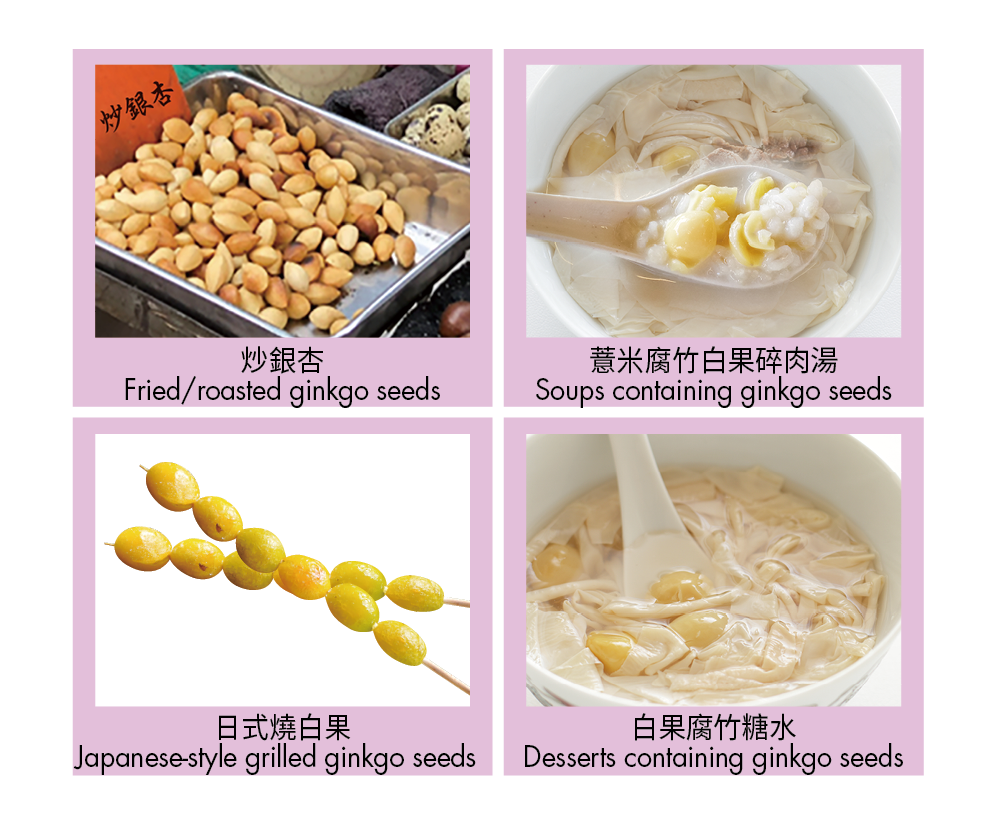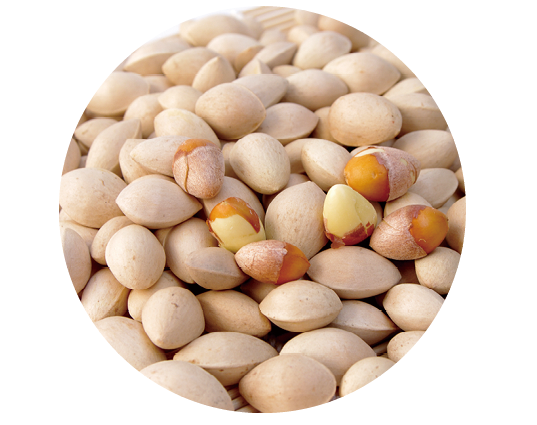
Food Safety Focus (149th Issue, December 2018) – Incident in Focus
The Ginkgo – A Living Fossil with Poisonous Seeds
Reported by Mr. Johnny CHU, Scientific Officer,
Risk Assessment Section, Centre for Food Safety
In November, 2018, the Centre for Health Protection of the Department of Health announced a case of ginkgo seed poisoning. The case involved a 38-year-old woman who developed dizziness, nausea, tremor, headache and abdominal pain after consuming around 50 to 60 fried ginkgo seeds purchased from a street hawker.
Ginkgo biloba
Ginkgo biloba, commonly known as ginkgo, the maidenhair tree, and Yín Xing, is famous for having witnessed dinosaurs roaming the earth as well as their sudden disappearance from the earth. Once thought to be extinct by some researchers in the West, the ginkgo is native to China and now has made its way around the world. Ginkgo is often called a living fossil because it has remained essentially unchanged for 200 million years and can be found in the fossil record at the same time as the dinosaurs.

Ginkgo seeds consumed as food
Ginkgo Seeds as Food
The ginkgo seeds (Bai Guo in Chinese) are commonly consumed as food in Asia (especially China, Japan and Korea); they are used as an ingredient in congee, soups, dinner dishes and desserts. It is also not uncommon to see food premises serving Japanese-style grilled ginkgo seeds and street hawkers selling fried/roasted seeds.

Ginkgo seeds
Toxins in Ginkgo Seeds
Natural toxins are present in a wide variety of plants (Table below), some of which are commonly consumed as food, including ginkgo seeds. Ginkgo seeds have poisoning effects due to the presence of toxins such as 4'-methoxypyridoxine (MPN) and cyanogenic glycosides; and MPN is believed to be the incriminated chemical in food poisoning cases.
MPN is found in the food storage tissue of the ginkgo seeds. It has an antivitamin B6 activity and inhibits the formation of 4-aminobutyric acid (GABA) from glutamate. GABA and glutamate play a role in transmitting nerve signals from one nerve cell to another. The dual effect of a decrease in GABA and an increase in glutamate is believed to induce seizures and convulsions. Cooking cannot inactivate MPN; however, it can reduce the toxicity of the seeds, probably by inactivating heat-labile toxins such as cyanogenic glycosides. It is worth noting that immature and uncooked ginkgo seeds are more toxic.
Examples of food poisoning cases caused by plant and mushroom toxins in Hong Kong from 2008 to 2018.
|
Plants |
Toxins |
Symptoms |
Preventive measures/ |
|---|---|---|---|
|
Ginkgo seeds |
4'-methoxypyridoxine and cyanogenic glycosides |
Nausea, vomiting, diarrhoea, abdominal pain, confusion and convulsions |
|
|
Calcium oxalate raphide |
Numbness of the tongue and swelling of lips |
|
|
|
(1) Wild mushrooms |
Mushroom toxins |
Nausea, vomiting, abdominal pain, profuse sweating, hallucination, coma or other neurological symptoms |
|
|
Colchicine
|
Vomiting, nausea, abdominal pain and diarrhoea |
|
|
|
Cyanogenic glycosides |
Constriction of the throat, nausea, vomiting and headache |
|
|
|
Toxic alkaloids |
Nausea, vomiting, diarrhoea and dizziness |
|
|
|
Wild fruits |
Plant toxins |
Abdominal pain, vomiting, diarrhoea and burning sensation of the throat |
|
Public Health Significance
Acute toxicity is the main concern of ginkgo seed poisoning. Nausea, vomiting, diarrhoea, abdominal pain, confusion and convulsions are the classic symptoms which usually begin 1 to 12 hours after ingestion. Children are especially susceptible to this type of food poisoning. In severe cases where large amounts have been taken or in susceptible individuals, loss of consciousness and deaths may occur. It has been reported that ingestion of 10 to 50 cooked seeds at one time can cause acute poisoning.
Action Taken and Preventive Measures
Regarding the case of ginkgo seed poisoning, a press release and a message on Facebook were issued by the Department of Health and the Centre for Food Safety respectively on 5 November 2018 to remind the public not to consume uncooked ginkgo seeds and to limit the daily intake of ginkgo seeds. Particular attention should be given to children, the elderly and individuals with poor health conditions.
Key Points to Note:
- Natural toxins are present in ginkgo seeds.
- Cooking can reduce but cannot eliminate the toxicity of the seeds.
- Ingestion of 10 to 50 cooked seeds at one time can cause acute poisoning.
Advice to the Trade
- Provide food safety advice to consumers such as reminding customers not to consume more than a few seeds per day.
Advice to the Public
- Cook ginkgo seeds before consumption to reduce the toxicity.
- Limit intake to a few seeds per day, especially for children, the elderly and individuals with poor health conditions.
- Immediately consult medical professionals for advice and prompt treatment if symptoms of poisoning develop.

